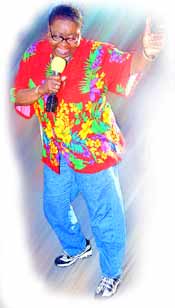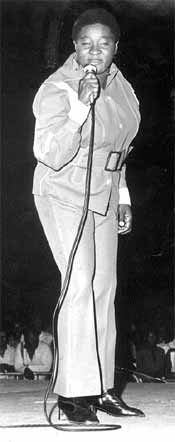|
|
|
The Singing Of The Road March |
Calypso Rose
The Petals Have Not Withered
By Deborah John
January 26, 2003
 A youthfull looking Calypso Rose, performed last Wednesday on the Brian Lara Promenade, Port of Spain. A youthfull looking Calypso Rose, performed last Wednesday on the Brian Lara Promenade, Port of Spain.
At 63, McArtha Linda Sandy Lewis better known as Calypso Rose is big and beautiful, bouncy and confident. It's a far cry from the days when at the age of 16 and a skinny, 114 lbs she first stood on the stage of the original Original Young Brigade Tent.
On Thursday last, it was Rose's day. She was honoured by the Mayors of Arima and Port of Spain who, respectively, gave her a plaque and the keys to the city. Its only the latest in a long line of awards and honours that she's has already received from countries all over the world. She received the keys to the city of Ontario, Canada from the Mayor of St Catherine in 1993.
Here at home, two years ago, she received the Hummingbird Gold. She deserves all the honours and tributes that are now being heaped on her in her homeland however, for this woman is truly a trailblazer who paved the way for all the women everywhere who are now calypsonians.
But to write about Rose we must first explain that during this interview last Wednesday an exuberant laugh was never far from her lips. She also danced and chipped constantly, and thrilled a group of visiting schoolgirls and their teachers with a verse and chorus from "Fire In Meh Wire". Dressed in fire bright red, she had them singing along and then signed autographs for the excited group.
But later on, it was a quiet and reflective Rose who spoke about her teenage days and early childhood. She was born in Tobago.
"Thirteen of us in a one-bedroom house."
An uncle lived in Barataria, he had no children and offered to have one of the young Lewis' come live with himself and his wife.
"Well you know they wasn't really married, she was living with him, but he sent her over to choose one of us and my mother put all of us to stand up in a line. I was little and in those days I used to suck my finger. I used to stammer, and she saw me standing there and said "darling, what is your name?" and I said "c...c...c...c..artey". She took my hand and said, "you want to come to Trinidad with me?" The next day we went on the boat.
Rose was nine years old at the time but when the excitement of travelling at that age subsided she missed her siblings. Her aunt had only elderly friends. In San Juan Government where her aunt enrolled her, with all the natural callousness of small children and inbred Trini arrogance, her schoolmates called her "small island."
"It was a very sad life, at home (in Tobago) I had brothers and sisters to fight with, I was in the centre of three boys, is Kelvin, is me, then Sonny, then Lloyd. It was very demoralising to me."
But as Rose talks, you can see what her aunt saw and why her heart must have gone out to the skinny little girl, picky head (her words), sucking the middle finger and with an endearing nervous stammer. But after a while things got better.
"I hung in there and I came to regard her as a mother, she was never a bad aunt."
We have to imagine that Rose's schooldays were that of the average child from a black working class family of that era because in the interview she does not dwell too much on those days. But she was in the school choir. Her uncle was a Seventh Day Adventist and this would be the source of plenty quarrelling, when later on, she went to sing in the tent. In her early teenage years she also worked in a palette factory in St James and was a children's nanny to a Chinese family in Woodbrook.
But she believes she was born with a gift. "I come here to do this." Her grandfather used to play the violin for weddings in Tobago, her mother's mother "could sing nice", and a great uncle sang in several choirs.
Even with her powerful voice, though, those early days in calypso were not easy. It made her strong, however, she's overcome the stammer, although there are slight traces when she becomes excited. Lady Iere was her predecessor but by the time she came into it in the 1950s, singing in a tent was still definitely not the thing for a female. But she says the men in the tent respected her, except for one famous calypsonian who in a effort to frighten or unnerve her, "shook his thing" at her.
Spoiler, who led the cast in 1957, at the Original Young Brigade she remembers as being a "fine guy". "He was light skinned and he used to wear his hat cock on the side." He had long fingers and when he sang, he would curl them into his hands. She also remembers him composing his songs in a most unusual manner.
"He never wrote down anything in a copybook. He would take a matchbox and empty all the matchsticks. He would break all the sticks and the lyrics would come out of his head. He was great."
The first song she sang in the tent and she sings and recalls the words as if it were yesterday was "Glass Thief". This was based on an incident she saw in the Croisee. She comes from the era in which a calypsonian had to come up with 12 original songs every season and being a talented writer Rose has sung and composed over 800 songs, most of which she can remember and sing verses from on demand.
She was also happy to set the record straight on something that is commonly regarded as a fact.
"No," she says with emphasis, "Sparrow did not sing ‘Rose girl ah want yuh bad,' for me. When he sang that calypso, I did not even know him."
Rose who now lives in the US is still intensely proud of her Tobago heritage and she still expresses hurt over an incident that happened in the 1980s, that led to her decision to take up residence abroad. She was a passionate supporter of the NAR and ANR Robinson. She felt that Tobago was neglected by Trinidad.
Calypso Rose in 1973
 She ticks off the complaints on her finger: She ticks off the complaints on her finger:
¤ All the old vehicles were sent to Tobago.
¤ One hospital.
¤ Bad roads.
¤ If the boat broke down and the cooking gas couldn't come the island people had to resort to wood fires.
"So I sang "Robinson gi dem pressure, turn on de pressure."
The name of the song was "Turn on de Pressure" and apparently it touched some nerves of the party faithful in Trinidad. Prior to the 1986 election, Rose had come to Port of Spain to buy some foreign exchange.
"Just US$100 and they had me waiting. Eventually someone told me I had to declare all my assets and they spoke to me in a very disparaging way. When they did come out to give me the money, they said "here take your money and go."
So that's what she did and its taken her all around the world. She reflects that if her father, the strict Spiritual Baptist who had his own church and her uncle, the strict Seventh Day Adventist were alive today they would be amazed at how far calypso has taken her. At the age of 11 she decided on her own that she wished to be baptised in the Spiritual Baptist Faith and she says she has never regretted the decision. "It keeps me sane."
She has sung calypso in almost every major country in the world. "Chile, I have pages and pages of awards", she says matter of factly.
She was made an honorary citizen of Belize in 1982. She explains that she wrote a lot of calypsoes which put the country on the map culturally. One of these was "Let We Punta" and she campaigned for the introduction of Carnival there with the tune "Fire in Belize". The BBC even did a programme which is normally devoted to politics and politicans on her relationship with that country. She has toured the Caribbean extensively over the years. She has also toured Europe and all the Scandanavian countries many times. She can also say confidently that she prefers West Africa to North Africa and can explain why. She sings every year with a large luxury crusie ship.
She was the first person to win the National Monarch and Road March titles in the same year - 1978 with the compositions "I Thank Thee" and "Her Majesty". She won the Calypso Qeen titles from 1974 to 1978 and she was honoured by the National Women's Action Committee (NWAC) in 1991. Some of her greatest hits have been "More Tempo", "Fire, Fire", and "Come Leh We Punta.". This season "Fire" has been introduced to a new generation with Double D's "Fire -Tribute to Rose".
Looking at Rose you can't imagine that she's a cancer survivor, because her strong physique shows no trace of having suffered serious illness.
"I am a cancer survivor," she says proudly, although she deplores the manner in which the public had to learn about it. Three years ago young calypsonian Kurt Allen portrayed Rose as dying of cancer in "Heroes" the calypso he wrote for Denyse Plummer. She is no longer angry, but she says Alleyne's careless treatment of it caused a lot of her overseas engagements to be cancelled.
"People need to understand how you feel when you find out you have an illness like that. It was in 1996 when I got the news. I had surgery on October 1, 1996, to remove particles of the breast. Then radiation treatment started from December 14, 1996 into February1997. After the radiation I was depressed, so I went to Haiwai to run away from myself. I really went for 10 days but after three days I realised my family was not with me, and I said what am I doing here and I went back home"
Home includes her stepdaughter and her five grandchildren and the three brothers who live in New York.
Her daily regime includes a lot of exercise. Her diet is also chosen with a view to fitness. It includes a lot of fish. "I use more olive oil and water for cooking. I use pumpkin and cats claw which is good for cancer. I use a lot of water cress and I take a lot of herbal treatments from my brother Lloyd Sandy, 1,000 milligrammes of Vitamin C daily. I hardly eat red meat."
Today she's glad to see how women have prospered in the art form and two of the women calysonians she admires are Denyse Plummer and Singing Sandra.
|

|

 A youthfull looking Calypso Rose, performed last Wednesday on the Brian Lara Promenade, Port of Spain.
A youthfull looking Calypso Rose, performed last Wednesday on the Brian Lara Promenade, Port of Spain. She ticks off the complaints on her finger:
She ticks off the complaints on her finger: